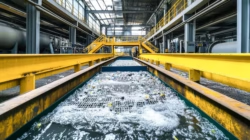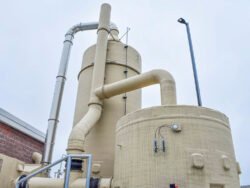Mason Farm Wastewater Treatment Plant
Title: The Mason Farm Wastewater Treatment Plant: A Model of Sustainable Water Management
Abstract
The Mason Farm Wastewater Treatment Plant, located in Chapel Hill, North Carolina, is more than just a facility for treating sewage; it exemplifies advanced wastewater management, sustainability practices, and community commitment to environmental stewardship. From its innovative engineering design to its multifaceted approach to water reclamation and biosolid management, the plant serves as a beacon for similar facilities worldwide. This article delves into the history, technological innovations, operational mechanisms, environmental impact, and future prospects of the Mason Farm Wastewater Treatment Plant, presenting it as an essential player in the global pursuit of sustainable water management.
Introduction
In today’s rapidly urbanizing world, the importance of efficient and sustainable wastewater management cannot be overstated. Wastewater treatment plants play a vital role in protecting public health, safeguarding natural ecosystems, and ensuring the sustainability of water resources. Mason Farm Wastewater Treatment Plant stands out as a cornerstone of such efforts, providing impeccable services to the communities it serves while integrating advanced technologies that push the envelope in environmental conservation and resource recovery.
Historical Context and Development
The Mason Farm Wastewater Treatment Plant was commissioned in the early 1970s in response to the growing need for effective sewage treatment in the expanding urban area of Chapel Hill and Carrboro. Initially designed to handle a modest flow, the plant has continually evolved to accommodate the increasing demands of the population it serves. Strategic expansions in the 1980s, 1990s, and 2000s have seen the plant’s capacity grow, with the latest enhancements incorporating state-of-the-art technology designed to meet stringent environmental regulations.
Over the decades, the plant has seen numerous upgrades focused on both increasing capacity and improving the quality of the effluent discharged into local water bodies. Key milestones include the introduction of tertiary treatment processes, the development of advanced nutrient removal systems, and the implementation of energy-efficient technologies aimed at reducing operational costs and environmental footprints.
Technological Innovations
One of the standout features of the Mason Farm Wastewater Treatment Plant is its adoption and integration of cutting-edge technologies. The following sections detail some of the primary technological advancements that distinguish the plant:
-
- Primary Treatment Enhancements
The initial phase of wastewater treatment involves physical processes such as screening and grit removal. Mason Farm utilizes fine screens to prevent large particles and debris from entering subsequent treatment stages. Grit chambers are designed to allow the settling of sand and heavy particulates, thereby protecting downstream equipment from abrasion and clogging.
- Primary Treatment Enhancements
-
- Secondary Treatment Processes
The secondary treatment phase at Mason Farm employs biological processes to degrade organic matter present in the wastewater. The plant utilizes an activated sludge process, which involves aerating the wastewater to promote the growth of beneficial microorganisms that consume organic pollutants. Recent upgrades have incorporated membrane bioreactors (MBRs) that combine biological treatment with membrane filtration, resulting in higher-quality effluent with significantly reduced levels of contaminants.
- Secondary Treatment Processes
-
- Tertiary Treatment and Nutrient Removal
In response to the need for more stringent effluent quality standards, the Mason Farm plant has invested in advanced tertiary treatment technologies. This phase involves further removal of suspended and dissolved substances, particularly nutrients such as nitrogen and phosphorus, which can contribute to eutrophication in receiving water bodies. The plant employs biological nutrient removal (BNR) processes alongside chemical precipitation techniques to achieve low nutrient concentrations in the final effluent.
- Tertiary Treatment and Nutrient Removal
-
- Disinfection and Effluent Quality Control
The final step in the treatment process involves disinfection to eliminate pathogenic microorganisms. Mason Farm uses ultraviolet (UV) disinfection, which is both effective and environmentally friendly compared to traditional chlorine-based methods. Continuous monitoring and automated control systems ensure that the effluent consistently meets or exceeds regulatory standards before being discharged or reused.
- Disinfection and Effluent Quality Control
Sustainability and Resource Recovery
A hallmark of Mason Farm’s operations is its commitment to sustainability and resource recovery. By viewing wastewater not merely as waste but as a resource, the plant has implemented several key initiatives aimed at maximizing the beneficial reuse of byproducts.
-
- Water Reuse
One of the significant contributions of the Mason Farm plant to sustainability is its extensive water reuse program. Treated effluent is reclaimed and used for various non-potable purposes, including irrigation, industrial processes, and cooling water systems. This approach not only reduces the demand on freshwater resources but also provides cost savings for the community.
- Water Reuse
-
- Energy Efficiency and Renewable Energy
Mason Farm has invested heavily in energy-efficient technologies and renewable energy sources to minimize its carbon footprint. The plant employs cogeneration systems that utilize biogas produced during the anaerobic digestion of biosolids to generate electricity and heat. Additionally, the installation of solar panels on-site contributes to the plant’s overall energy independence.
- Energy Efficiency and Renewable Energy
-
- Biosolid Management and Reuse
The treatment process generates biosolids as a byproduct, which are rich in organic matter and nutrients. Mason Farm has established a comprehensive biosolid management program that includes anaerobic digestion to stabilize the material, reducing pathogens and odors. The stabilized biosolids are then processed into Class A biosolids, which are safe for beneficial reuse as soil amendments in agriculture and landscaping.
- Biosolid Management and Reuse
-
- Nutrient Recovery
The plant has implemented innovative nutrient recovery technologies to capture valuable compounds from wastewater streams. Through processes such as struvite precipitation, the facility recovers phosphorus in the form of crystalline minerals that can be used as slow-release fertilizers, thus closing the loop on nutrient cycles.
- Nutrient Recovery
Environmental Impact and Compliance
The Mason Farm Wastewater Treatment Plant is subject to stringent regulatory requirements aimed at protecting water quality and the environment. The plant consistently meets or exceeds these standards, demonstrating its commitment to environmental stewardship.
-
- Effluent Quality and Receiving Waters
The plant’s effluent is discharged into Morgan Creek, a tributary of the Cape Fear River. Through rigorous treatment processes and continuous monitoring, Mason Farm ensures that the discharged effluent has minimal impact on the receiving water body. Advanced treatment techniques and frequent sampling help maintain low levels of pollutants, safeguarding aquatic life and downstream water quality.
- Effluent Quality and Receiving Waters
-
- Air Quality and Odor Control
Odor control is a critical aspect of wastewater treatment operations, particularly for facilities located near residential areas. Mason Farm employs a combination of technologies, including activated carbon filters, biofilters, and chemical scrubbers, to effectively manage and mitigate odors. This proactive approach minimizes the impact on surrounding communities and contributes to a positive perception of the plant.
- Air Quality and Odor Control
-
- Sustainable Practices and Green Infrastructure
In addition to technological advancements, Mason Farm has embraced sustainable practices and green infrastructure solutions. The plant incorporates natural landscapes, such as constructed wetlands and vegetative buffers, to enhance stormwater management and provide habitat for local wildlife. These features also contribute to the aesthetic value of the facility, creating a harmonious blend with the surrounding environment.
- Sustainable Practices and Green Infrastructure
Community Engagement and Education
An often-overlooked aspect of wastewater treatment facilities is their role in community engagement and education. Mason Farm Wastewater Treatment Plant takes pride in its efforts to educate the public about the importance of wastewater management and environmental sustainability.
-
- Public Outreach and Tours
The plant regularly organizes guided tours for school groups, community organizations, and interested residents. These tours provide a firsthand look at the treatment processes, highlighting the plant’s innovative technologies and sustainable practices. By fostering a deeper understanding of wastewater treatment, Mason Farm encourages community support and involvement in environmental initiatives.
- Public Outreach and Tours
-
- Educational Programs and Partnerships
Mason Farm collaborates with local schools, universities, and non-profit organizations to develop educational programs focused on water conservation, pollution prevention, and sustainable living. These programs include interactive workshops, classroom presentations, and hands-on activities that engage participants of all ages and backgrounds.
- Educational Programs and Partnerships
-
- Community Involvement in Decision-Making
The plant values community input and actively seeks feedback from local stakeholders. Public meetings, surveys, and open houses provide platforms for residents to voice their concerns, ask questions, and participate in decision-making processes. This collaborative approach fosters transparency and accountability, ensuring that the plant’s operations align with the needs and priorities of the community.
- Community Involvement in Decision-Making
Challenges and Future Prospects
While Mason Farm Wastewater Treatment Plant has achieved remarkable success in its operations and sustainability efforts, it faces ongoing challenges that require innovative solutions and adaptive strategies.
-
- Population Growth and Increased Demand
As the population of Chapel Hill and Carrboro continues to grow, the demand for wastewater treatment services is expected to rise. The plant must continue to expand its capacity and enhance its efficiency to meet this increased demand while maintaining high standards of effluent quality.
- Population Growth and Increased Demand
-
- Emerging Contaminants
Emerging contaminants, such as pharmaceuticals, personal care products, and microplastics, pose new challenges for wastewater treatment facilities. These substances can have adverse effects on aquatic ecosystems and human health. Mason Farm is actively researching and implementing advanced treatment technologies, such as advanced oxidation processes and nanofiltration, to address these emerging threats.
- Emerging Contaminants
-
- Climate Change and Resilience
Climate change poses significant risks to wastewater treatment infrastructure, including increased frequency and intensity of extreme weather events, sea-level rise, and temperature fluctuations. Mason Farm is investing in resilience measures, such as flood protection, infrastructure hardening, and adaptive management practices, to ensure the continued reliability and effectiveness of its operations in the face of a changing climate.
- Climate Change and Resilience
-
- Regulatory and Policy Changes
The regulatory landscape for wastewater treatment is continually evolving, with new standards and guidelines being introduced to address emerging environmental and public health concerns. Mason Farm remains proactive in monitoring regulatory developments and adapting its practices to comply with new requirements. This includes collaborating with regulatory agencies, participating in industry associations, and staying informed about best practices and technological advancements.
- Regulatory and Policy Changes
Conclusion
The Mason Farm Wastewater Treatment Plant stands as a shining example of excellence in wastewater management, sustainability, and community engagement. Through its innovative technologies, commitment to environmental stewardship, and proactive approach to resource recovery, the plant has demonstrated that wastewater treatment can be both efficient and sustainable.
As the challenges of population growth, emerging contaminants, climate change, and regulatory changes continue to evolve, Mason Farm is well-positioned to adapt and lead the way in the pursuit of sustainable water management. By embracing a holistic and forward-thinking approach, the plant not only ensures the health and well-being of the communities it serves but also contributes to the global effort to protect and preserve our precious water resources.
The future of wastewater treatment lies in the ability to integrate technological advancements, sustainable practices, and community engagement. The Mason Farm Wastewater Treatment Plant exemplifies this vision, setting a benchmark for other facilities worldwide. Its success serves as a reminder that with innovation, collaboration, and dedication, we can achieve a sustainable and resilient future for our water systems and our planet.


